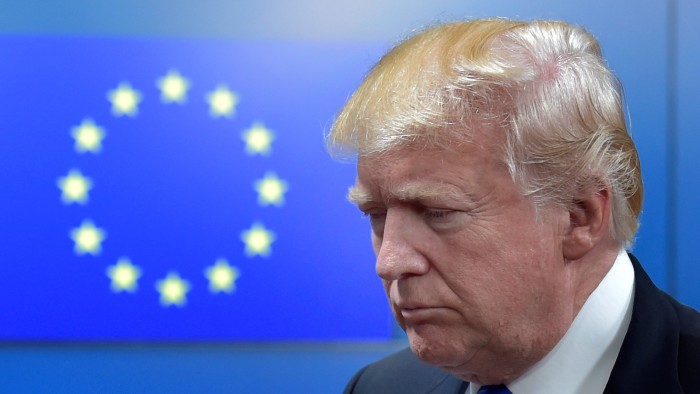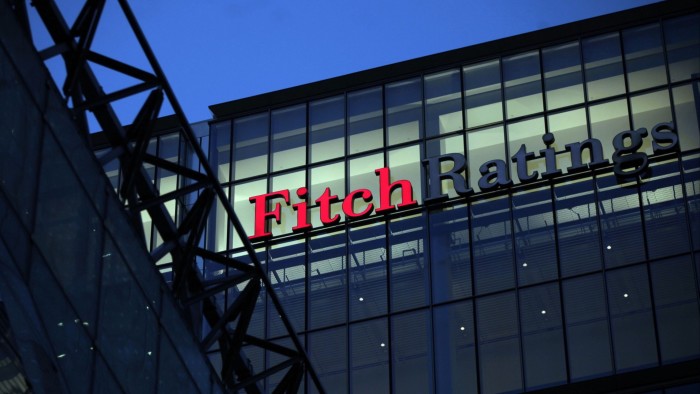Canada and Mexico leaders take credit for dodging latest US tariffs
Unlock the White House Watch newsletter for free
Your guide to what the 2024 US election means for Washington and the world
Mexican and Canadian officials spent Wednesday afternoon frantically searching Donald Trump’s “reciprocal tariff” list for the latest bad news from Washington, only to discover they had been granted a reprieve.
An exemption for goods exported to the US under the three countries’ free trade agreement relieved those who had feared the US president would place further tariffs on his two biggest trading partners.
“Mexico doesn’t have additional tariffs . . . that’s because of the good relationship we’ve built between the government of Mexico and the government of the United States, based on respect,” President Claudia Sheinbaum said the following day.
But Canada’s Prime Minister Mark Carney, currently on the campaign trail ahead of a general election later this month, cautioned the “actions by the US administration, while not specifically targeting Canada, will rupture the global economy and adversely affect global economic growth”.
In response, he announced 25 per cent tariffs on non-USMCA compliant vehicles imported from the US that will take effect in the coming days. According to a Canadian government official the measure is expected to raise C$8bn (US$5.6bn) that will be used to provide relief packages to protect workers and businesses.
Despite the difference in tone, both leaders claim their approaches have helped them this week avoid what Trump calls “liberation day” tariffs.
Although their free trade agreement with the US was agreed during Trump’s first term, the president has threatened them with tariffs for months, blaming Ottawa and Mexico City for soaring levels of illegal immigration and the trafficking of the deadly opioid, fentanyl.
After imposing 25 per cent tariffs on steel and aluminium imports soon after taking office, in February the US president applied an addition 25 per cent levy on all imports from Canada and Mexico, apart from Canadian oil and energy products, which faced 10 per cent. Days later he postponed the measures, only to reverse his decision last month and then U-turn again.
He also imposed 25 per cent tariffs on all car imports, regardless of whether or not they comply with the free trade agreement, known as the USMCA, that came into effect on April 2.
In response Ottawa in March imposed a 25 per cent tariff on a broad range of US products worth C$29.8bn.
Mexico has not retaliated, instead following what Sheinbaum calls a “cool headed” strategy of meeting Trump’s demands rather than confronting him.
Mexican officials on Thursday said the strategy had borne fruit and they would focus on getting an even better deal. Economy minister Marcelo Ebrard said: “It’s a great achievement, I’d say, from the point of view of where we started not long ago that there would be no exemptions.”
Sheinbaum and Carney have also enjoyed significant bumps in the polls since Trump began imposing tariffs on their countries. The US president’s levies, along with threats to annex Canada as a 51st state have provoked anger north of the border, with Canadians boycotting US goods and the new prime minister’s firm stance winning him plaudits at home.
But despite avoiding the most recent tariff curveball, the impact of the existing levies could be severe.
According to Trump’s latest executive order, Mexico and Canada’s 25 per cent tariff on non-USMCA goods would go down to 12 per cent if the US is happy with their compliance on stopping fentanyl and halting illegal migration.
However, goods that do not comply with USMCA rules, as well as steel, aluminium and cars, will remain subject to the earlier 25 per cent tariff.
Car manufacturing, long considered the heart of regional economic integration, with parts famously crossing all three nations for assembly, is particularly vulnerable to the levies, with millions of jobs dependent on the sector.
Carmaker Stellantis has furloughed US workers and has paused some production in Mexico and Canada.
Mexico’s economy is in a sharp slowdown and many economists believe it is sliding towards recession, while Carney has raised concerns that any negative impact of tariffs on the US economy could also hit its neighbours.
“When the US has a recession it’s very difficult for Canada to avoid something similar,” he said.
A broader change to the USMCA also looks likely, with Carney saying there had been “so many violations” that the free trade agreement needs “a renegotiation”.
Nonetheless, Mexico remains upbeat, with Sheinbaum on Thursday trying to lure companies to invest in USMCA-compliant production in the country.
“We think that with the dialogue we’ve established there are the conditions to have a better deal,” she said.








